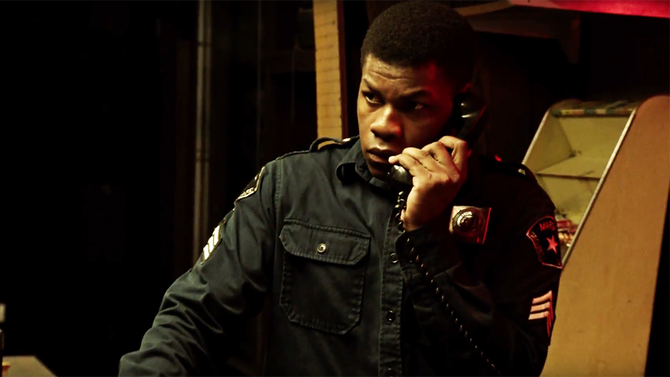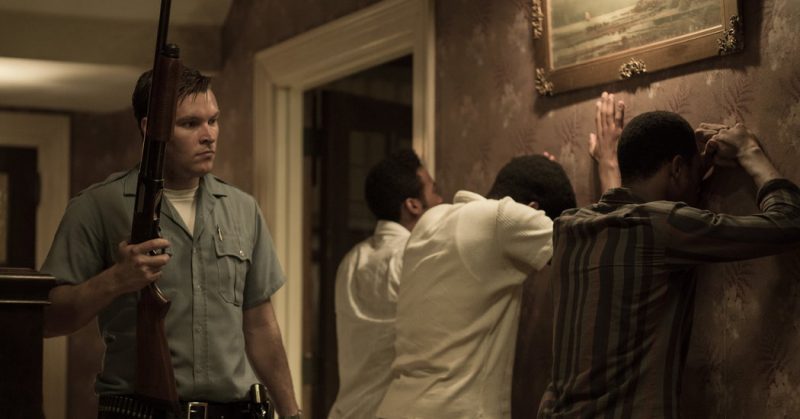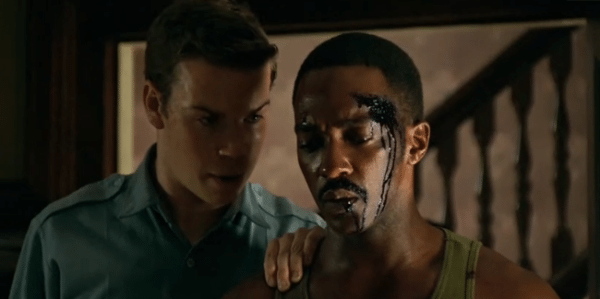Detroit Review
"Tight and tense emotional rollercoaster"
2017 has been a big year for the racially charged film with Jordan Peele's
Get Out leading the pack. That film made such a splash that tons of conversations, podcast and think pieces cropped up and continue to push Peele's social thriller deeper into our collective consciousness and as well as pop culture. Here we are now, roughly six months later, and Kathryn Bigelow has offered a film that attempts to tackle the infamous Algiers Motel incident during the summer of 1967 in Detroit and the result is nothing short of intense.
Bigelow begins the film with a partially animated sequence of the "Migration Series" by the legendary Harlem Renaissance artist Jacob Lawrence to show the African-Americans moved from the Deep South to find better, more fulfilling and most of all, safe lives for themselves and their families in the midst of intense racial violence, setting the stage for the incident where police raid a party held at an unlicensed nightclub of all black patrons celebrating the return of Vietnam vets from the war.

This leads to increasing violence and lawlessness over the course of five days and before the end of it all, the Algiers Motel incident transpired, which resulted in the deaths of three African-American teens, while nine others including two white women, were badly beaten. Here is the film's meaty centerpiece where all the threads come to a head. Bigelow keeps the palpable tension high and the shooting and editing of the extended sequence surgically precise, making for a strong dramatic anchor for the entire film. Every actor in that scene gives their all, but Will Poulter must be singled out for the Most Despicable Character of the Year award for 2017. He brings great menace and twisted darkness to the role of a racist, power hungry police officer. John Boyega continues to prove himself with his remarkable range on display as the security guard on duty the night of the tragedy.
Under Bigelow's direction, cinematographer Barry Ackroyd employs a documentary-style approach, which at first can seem a bit off putting for a film attempting to honor the true-life events of the Algiers Motel incident, but upon further reflection, the style works to put the viewers right into the action. Shaky camera shots, combined with tight zooms, right down to the visual look and color palette of the film serve to not only put us into the action, but we are put into the period of the late 1960's. Further solidifying the notion of place and time is the inclusion of footage from news broadcasts, reports and audio recordings from the time, complete with newspaper clippings and the like. They feel strategically placed and peppered throughout the film, filling out some of the more peripheral aspects of the film.

Detroit will undoubtedly spark a wave of spirited discussion on race relations. In many ways, this film is a natural progression in the conversation of race-relations in the wake of a film like Get Out. Now it is more acceptable for a bolder calling out of racial injustice, particularly with regard to the dynamic with those in positions of power.
Following the showing of this film, an older white woman immediately yelled out, "they're still killing [black] people," as if ready to engage in conversation on what she had just witnessed. There was frustration in the tone, even exhaustion. No doubt she was in her youth during the time of the Algiers Motel incident 50 years ago. She had seen and continues to see forms of the injustice. This is the kind of thing that Bigelow's film calls to mind for viewers of a certain age who lived through some challenging times in America's history.

With any luck, the film will command further conversation not only for the old-timers but for those of us young kids to speak on and honor those who suffered that tragic summer night in '67. Bigelow and her team tackle an important subject with great honor and respect, regardless of any creative license taken with the material on which it is based. Plus, it is just darn good filmmaking.
Pros
- Cinematography/documentary-style filmmaking
- Kathryn Bigelow's steady and tight direction
- Will Poulter's menacing performance
- John Boyega's charismatic and emotionally engaging performance
- Inclusion of real news elements from the time
Cons
- Nothing major enough to include
 This leads to increasing violence and lawlessness over the course of five days and before the end of it all, the Algiers Motel incident transpired, which resulted in the deaths of three African-American teens, while nine others including two white women, were badly beaten. Here is the film's meaty centerpiece where all the threads come to a head. Bigelow keeps the palpable tension high and the shooting and editing of the extended sequence surgically precise, making for a strong dramatic anchor for the entire film. Every actor in that scene gives their all, but Will Poulter must be singled out for the Most Despicable Character of the Year award for 2017. He brings great menace and twisted darkness to the role of a racist, power hungry police officer. John Boyega continues to prove himself with his remarkable range on display as the security guard on duty the night of the tragedy.
Under Bigelow's direction, cinematographer Barry Ackroyd employs a documentary-style approach, which at first can seem a bit off putting for a film attempting to honor the true-life events of the Algiers Motel incident, but upon further reflection, the style works to put the viewers right into the action. Shaky camera shots, combined with tight zooms, right down to the visual look and color palette of the film serve to not only put us into the action, but we are put into the period of the late 1960's. Further solidifying the notion of place and time is the inclusion of footage from news broadcasts, reports and audio recordings from the time, complete with newspaper clippings and the like. They feel strategically placed and peppered throughout the film, filling out some of the more peripheral aspects of the film.
This leads to increasing violence and lawlessness over the course of five days and before the end of it all, the Algiers Motel incident transpired, which resulted in the deaths of three African-American teens, while nine others including two white women, were badly beaten. Here is the film's meaty centerpiece where all the threads come to a head. Bigelow keeps the palpable tension high and the shooting and editing of the extended sequence surgically precise, making for a strong dramatic anchor for the entire film. Every actor in that scene gives their all, but Will Poulter must be singled out for the Most Despicable Character of the Year award for 2017. He brings great menace and twisted darkness to the role of a racist, power hungry police officer. John Boyega continues to prove himself with his remarkable range on display as the security guard on duty the night of the tragedy.
Under Bigelow's direction, cinematographer Barry Ackroyd employs a documentary-style approach, which at first can seem a bit off putting for a film attempting to honor the true-life events of the Algiers Motel incident, but upon further reflection, the style works to put the viewers right into the action. Shaky camera shots, combined with tight zooms, right down to the visual look and color palette of the film serve to not only put us into the action, but we are put into the period of the late 1960's. Further solidifying the notion of place and time is the inclusion of footage from news broadcasts, reports and audio recordings from the time, complete with newspaper clippings and the like. They feel strategically placed and peppered throughout the film, filling out some of the more peripheral aspects of the film.
 Detroit will undoubtedly spark a wave of spirited discussion on race relations. In many ways, this film is a natural progression in the conversation of race-relations in the wake of a film like Get Out. Now it is more acceptable for a bolder calling out of racial injustice, particularly with regard to the dynamic with those in positions of power.
Following the showing of this film, an older white woman immediately yelled out, "they're still killing [black] people," as if ready to engage in conversation on what she had just witnessed. There was frustration in the tone, even exhaustion. No doubt she was in her youth during the time of the Algiers Motel incident 50 years ago. She had seen and continues to see forms of the injustice. This is the kind of thing that Bigelow's film calls to mind for viewers of a certain age who lived through some challenging times in America's history.
Detroit will undoubtedly spark a wave of spirited discussion on race relations. In many ways, this film is a natural progression in the conversation of race-relations in the wake of a film like Get Out. Now it is more acceptable for a bolder calling out of racial injustice, particularly with regard to the dynamic with those in positions of power.
Following the showing of this film, an older white woman immediately yelled out, "they're still killing [black] people," as if ready to engage in conversation on what she had just witnessed. There was frustration in the tone, even exhaustion. No doubt she was in her youth during the time of the Algiers Motel incident 50 years ago. She had seen and continues to see forms of the injustice. This is the kind of thing that Bigelow's film calls to mind for viewers of a certain age who lived through some challenging times in America's history.
 With any luck, the film will command further conversation not only for the old-timers but for those of us young kids to speak on and honor those who suffered that tragic summer night in '67. Bigelow and her team tackle an important subject with great honor and respect, regardless of any creative license taken with the material on which it is based. Plus, it is just darn good filmmaking.
With any luck, the film will command further conversation not only for the old-timers but for those of us young kids to speak on and honor those who suffered that tragic summer night in '67. Bigelow and her team tackle an important subject with great honor and respect, regardless of any creative license taken with the material on which it is based. Plus, it is just darn good filmmaking.